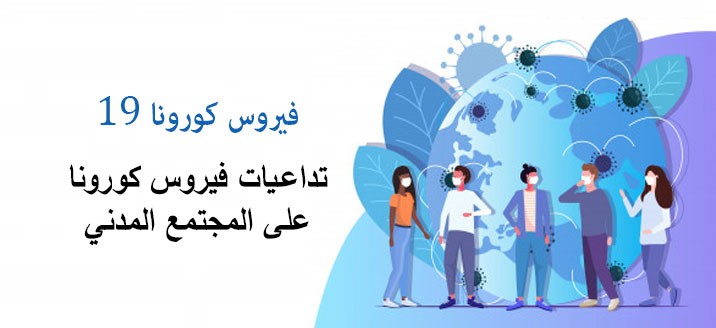Anas Al-Hasnawi, a Moroccan expert in civil society work, emphasized that Arab civil society organizations played a vital role in facing the aftermath of the Coronavirus pandemic, which contributed to alleviating its adverse effects on all levels, especially on health sectors.
This came during a workshop entitled "The effects of the Coronavirus pandemic on the reality of civil society organizations in the Arab world", which was implemented by PNGO via zoom in partnership with the Norwegian People's Aid (NPA).
Al-Hasnawi, member of the (Moroccan Espace Associatif) said that civil society organizations were not ready for this pandemic, which is the case in all sectors. Arab civil society organizations, and the whole world, had no previous knowledge nor experience in dealing with the pandemic, Al-Hasnawi added during the workshop, which dozens of officials, managers, and activists in Palestinian civil organizations attended.
Furthermore, Al-Hasnawi pointed to the Moroccan and Palestinian models as examples of the Arab civil society organizations' work nature and the roles they played in each country. These examples extend to almost all Arab countries with relative disparity according to each country's conditions.
“No one expected the pandemic to occur in this way”, Al-Hasnawi stressed,” there were no means that would enable civil society organizations to handle the severe global pandemic reliably.”
He continued that Palestinian civil society organizations are active and competent in their work as they interact with the frequently changing environment, due to the constant Israeli occupation violations and actions against the Palestinian people alongside the exemplary work of civil society organizations.
The situation in Morocco, he described, has been vague and fickle since 2011 and until the outbreak of the Coronavirus considering that the Moroccan development model failed at all levels despite the crucial constitutional amendment that rose against the February 20 movement.
Al-Hasnawi also pointed to the violations and restrictions on Moroccan civil society organizations which led them to demand their civil and democratic rights. This includes the re-discussion regarding the development model and forming its independent committee in the light of the increasing protests in the Moroccan streets last year.
Besides, civil society organizations agreed on two initiatives, he stated. The first is related to releasing political detainees to demonstrate some solidarity and reconciliation during the Coronavirus pandemic. The second is about involving them in all matters related to confronting the pandemic, since they have sufficient expertise, and the ability to deal with people due to their close contact with their needs and priorities.
Furthermore, Some civil society organizations have adapted to the new circumstances and changes, so they implemented remote activities in line with the quarantine state, which weakened some of their financial capabilities, and prevented them from communicating with the targeted groups, Al-Hasnawi commented.
Moreover, Al-Hasnawi indicated that some associations worked to provide services to the targeted groups, others monitored the performance of the authorities during the emergency, and violations and follow-up were observed as well. One of the violations that skyrocketed during the ongoing pandemic state was violence against women in psychological and economical ways.
In the same context, Al-Hasnawi pointed out that there are seven priorities of civil society organizations in the post-pandemic stage: the first is to resume all activities and programs while following precautionary measures. The second is to support and advocate vital sectors, especially the health and education. The third is to integrate technological means and remote communication technologies. The fourth is to assess the impact of the quarantine state on the targeted groups. The fifth is to support and advocate for youth, children, and women issues. The sixth is to follow-up on files and problems of women and violence against them, and finally To follow up on environmental issues.
Amjad Alshawa, director of the PNGO, mentioned at the beginning of the workshop the complicated political, economic, and social conditions witnessed in Palestine and the Arab world, which were far worsened by the pandemic and resulted in negative impacts on various life aspects.
Al-Shawa pointed out the effects of the pandemic on Palestinian and Arab civil society organizations and the difficulties they faced, stressing that these organizations have achieved, despite all challenges, positive results. They also played important roles, whether in communicating with official and unofficial parties or for the benefit of marginalized and vulnerable groups.
Al-Shawa also indicated PNGO role in defending the rights of citizens, the right to form associations and other issues in Palestinian and Arab societies.


